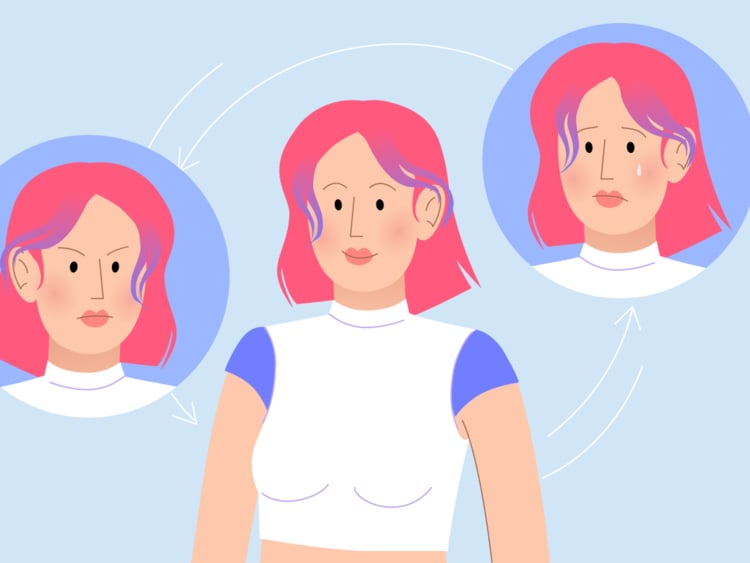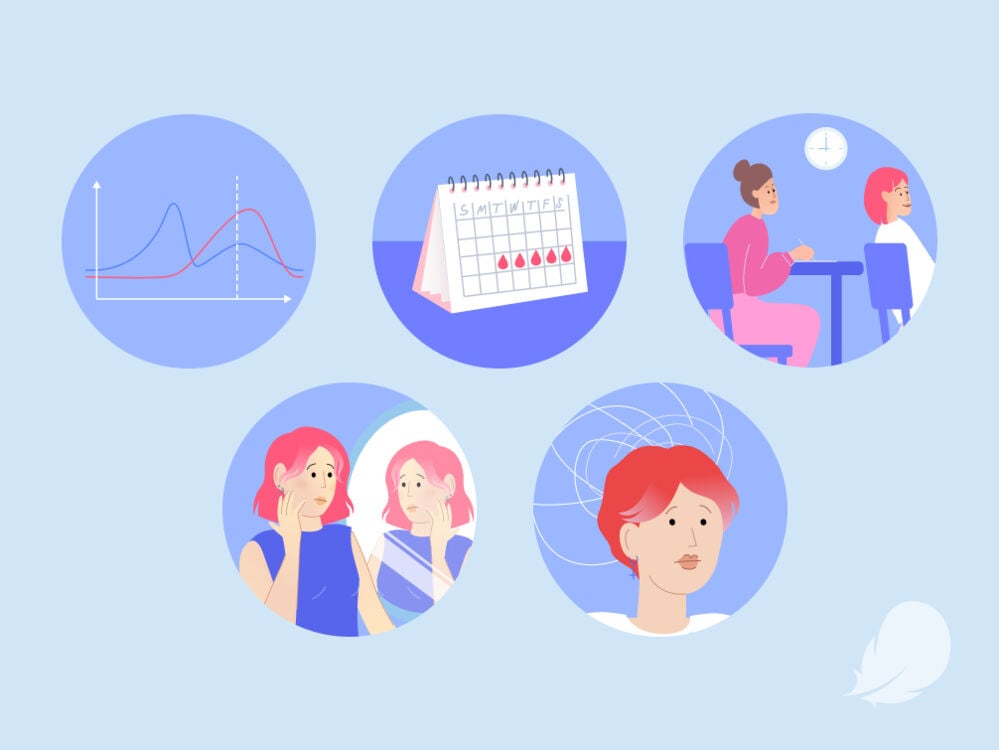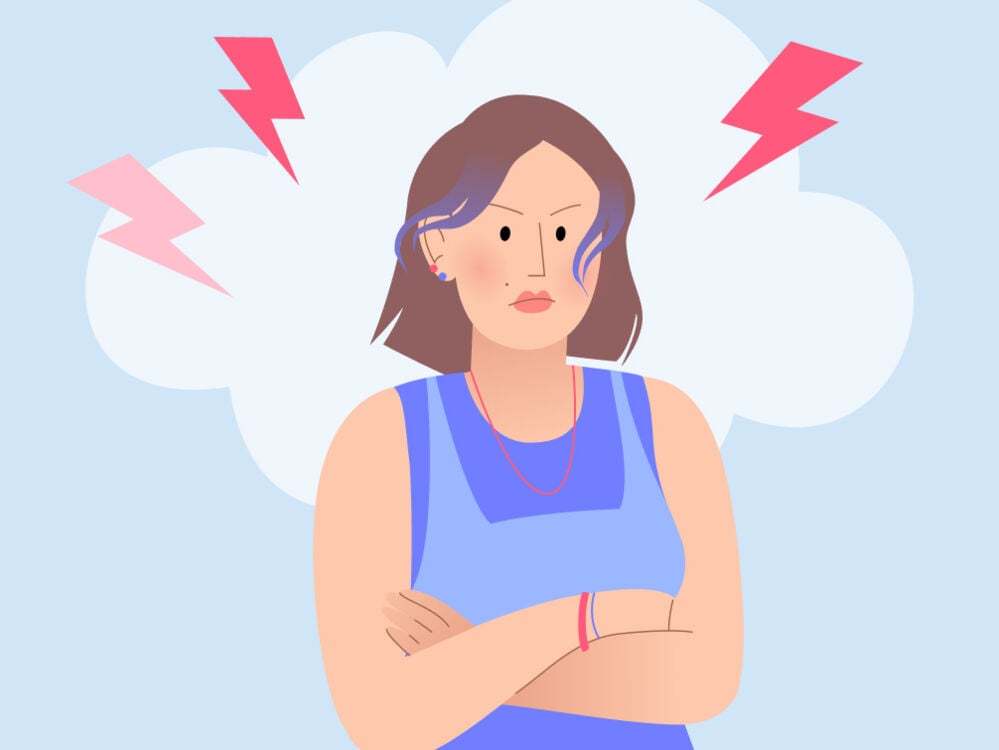Mood swings are widely accepted as a part of growing up, right? But there’s often a little more to it than just feeling snappier than normal. Here, a Flo expert explains what mood swings are and how you can manage them.
-
Tracking cycle
-
Getting pregnant
-
Pregnancy
-
Help Center
-
Flo for Partners
-
Anonymous Mode
-
Flo app reviews
-
Flo Premium New
-
Secret Chats New
-
Symptom Checker New
-
Your cycle
-
Health 360°
-
Getting pregnant
-
Pregnancy
-
Being a mom
-
LGBTQ+
-
Quizzes
-
Ovulation calculator
-
hCG calculator
-
Pregnancy test calculator
-
Menstrual cycle calculator
-
Period calculator
-
Implantation calculator
-
Pregnancy weeks to months calculator
-
Pregnancy due date calculator
-
IVF and FET due date calculator
-
Due date calculator by ultrasound
-
Medical Affairs
-
Science & Research
-
Pass It On Project New
-
Privacy Portal
-
Press Center
-
Flo Accuracy
-
Careers
-
Contact Us
What are some of the causes of mood swings? Your emotional ups and downs explained


Every piece of content at Flo Health adheres to the highest editorial standards for language, style, and medical accuracy. To learn what we do to deliver the best health and lifestyle insights to you, check out our content review principles.
Mood swings can impact the way you feel about the people closest to you. They’re one of the reasons why being a teenager can be complicated. You might have some days when you feel too sad or exhausted to do anything other than get back under the covers. Other times, you might snap at a friend without being entirely sure why they irritated you so much.
If you’re experiencing a roller coaster of emotions, it can feel pretty isolating. But it’s likely that many of your friends are feeling the same. It might help to understand a little bit more about what causes your mood swings, so we asked pediatric gynecologist Professor Beth Schwartz, Pennsylvania, US to share what exactly mood swings are, what might cause them, and if there’s anything you can do to manage them.

If you or someone you know is going through a difficult time, remember that there are ways to get help. Here are some support services and resources in your country.
Find out moreMood swings meaning: What exactly are they?
While they can be a nightmare when you’re experiencing them, mood swings are pretty much what they sound like — a quick and unexplained change in your mood. But before you go writing yourself off as a “moody teenager,” let’s dig into why they can actually be totally normal.
“Mood swings or changes are different for everyone,” says Dr. Schwartz. “Some people describe feeling down, some are more emotional (they may find themselves crying more than usual or for no reason), or some feel more irritable or even angry (little things annoy them or set them off that usually wouldn’t).”
Needless to say, mood changes can impact almost every aspect of your life. “[They] can range from nonexistent to a mild annoyance to having an enormous impact on life and people’s ability to go to school, participate in activities, and even function,” says Dr. Schwartz. So try not to be too hard on yourself if you’re finding you’re a little bit up and down sometimes.
What causes mood swings?
Along with finding new body hair and your boobs growing, mood swings are often treated as a regular part of growing up, and they typically aren’t anything to worry about.
“There are so many things that can cause changes in mood. Stress, irregular eating and sleeping, and drama with friends or school can definitely affect moods, as well as anything more serious going on with health or life,“ explains Dr. Schwartz.
You might be able to blame late-night TikTok sessions or a misunderstanding with a friend for your irritation — but there is actually some science behind mood swings, too. During your teenage years, your brain changes and develops rapidly. While you’re working out whether blue hair is the right color for you, your cognitive development (that’s the way your brain processes language, information, and emotions) is working in overdrive to help you grow into the adult version of yourself. You may start to create and express your own ideas, questions, and ways of thinking. This is really healthy, although it might not always feel that way.
This process is influenced by lots of different factors, and they can all play into how you feel. They include:
Puberty and hormonal changes
As mentioned above, if you’re a teen and feel like your moods can be a little bit all over the place, then puberty may be to blame. “Mood swings definitely increase after puberty due to both internal and external factors,” says Dr. Schwartz.
Bodily changes might feel like the most obvious changes during puberty, but you also experience major hormonal changes.
During your teen years, you produce lower levels of serotonin (sometimes called the happy hormone) than at any other point in your life. Serotonin is responsible for making you feel positive, regulating when you sleep, and helping you balance your moods. As your natural levels are low during puberty, you’re more likely to feel irritated or upset. See? Mood swings are totally natural. They’re not just you being too sensitive.
And, as you’ll know, there are parts of puberty that can be pretty confusing in themselves. On average, people transition toward puberty between the ages of 8 and 13. When it’s your time, your pituitary gland (the hormone control center in your brain) triggers the release of luteinizing hormone (LH) and follicle-stimulating hormone (FSH) into your bloodstream. Now stick with us here, as this might feel confusing. LH and FSH tell your ovaries (the glands that store your eggs) to start producing estrogen, the hormone that controls your menstrual cycle. In time, your ovaries will start to release an egg every month (called ovulation), and your period will start. Incredibly, it’s thought that you’re born with around 6 million eggs.
All of these new chemicals and hormones whizzing around your body can really affect how you feel. As your body adjusts to the hormones that are triggering your period to begin, so is your mind.
You might feel confused or self-conscious by the physical changes you experience during puberty. You will be getting to grips with your period and what your menstrual cycle typically looks like for you. This is a lot to take on. So, you can learn more about this using an app like Flo.
Periods and premenstrual syndrome (PMS)
You might be wondering if the mood swings will end on your 18th birthday. That’s when you become a full-fledged adult, right? Once puberty has calmed down, can you kiss mood swings goodbye forever? Annoyingly, it doesn’t always work out that way. Mood changes can continue to impact some people during their menstrual cycle well into adulthood.
It’s estimated that around 3 in every 4 people who have a period experience PMS. Even after puberty has calmed down, you’ll notice that mood swings might affect you for a couple of days within the week before your period starts. “Mood swings in the few days or up to 1 to 2 weeks prior to periods are likely due to hormonal fluctuations,” says Dr. Schwartz. “This often starts a few years after periods start, as people begin ovulating and have more regular periods and hormone fluctuations.”
You might notice that you feel tense or sad. Things that wouldn’t normally bother you might make you cry. Or you might not want to hang out with your mates as much. This is all totally typical of mood changes before your period.
“Occasionally, people have really severe symptoms, such as severe depression and anger. If this happens in relation to periods, it may be [premenstrual dysphoric disorder] PMDD, which is a severe version of PMS,” Dr. Schwartz says. But this is really rare. While 75% of women experience PMS, only 3% to 8% will experience PMDD.
They might be a totally normal period symptom, but mood swings are never fun. Dr. Schwartz says, “It is important to track mood changes, periods, other symptoms, and anything else that could be affecting moods.” You can do so using an app like Flo.

School and stress
Final deadlines, college applications, and will they/won’t they relationships — do any of these stresses sound like a hard relate?
It might feel comforting that you can partly blame your roller coaster of emotions on biology. But it’s also important to remember that growing up is tough. As you get older, you’re given more responsibilities. Finding the balance between getting good grades, a social life, and enough sleep can feel impossible. It’s totally normal and healthy to feel overwhelmed at times. But having a trusted adult or friends who you can talk to about it may make you feel a little bit better.
Working out who you are
As mentioned above, your brain is working in overdrive during your teen years to help you to mature into the adult you’ll be one day. But this isn’t purely a biological process.
Your teen years are a time for exploration. You’re working out who you are, who you want to date, the kind of style that makes you feel most comfortable, and the influences that are going to shape your identity as you grow. This is really exciting — but it’s also a lot. When you’re trying to create meaningful connections and show your friends and family who you are, it can be confusing and emotionally draining.
It’s totally normal to change and adapt as you grow. Try to be gentle with yourself. You don’t need to have it all worked out. And don’t hesitate to lean on those you are closest to for support.
Mental health conditions
Mood swings and changes are generally very typical and usually nothing to worry about. But that doesn’t mean they aren’t difficult when you’re navigating them.
If you’ve noticed that your mood changes have been more severe or persistent, then you might want to jot down:
- How you feel during your mood changes (Is it intense sadness or anger, for example?)
- How long your mood swings last
- How your mood swings impact your everyday life (at school, with friends, and at home)
If you’ve experienced a particularly bad patch when you’ve felt very low, sad, or anxious for longer than two weeks, then this may be an indication of other underlying mental health concerns. Other common symptoms include:
- Ongoing feelings of sadness
- Feelings of despair, helplessness, or guilt
- Low self-esteem
- Difficulty in relationships with your friends, partners, and family
- Finding it hard to get to sleep and remain asleep
- Changes in appetite
Mood changes are minimized as simply “part of the deal” when you’re growing up. And sometimes, they are just part and parcel of becoming an adult. But this jumble of feelings can also be uncomfortable and even distressing at times, so it’s really important to remember that you’re not alone.
If you’ve noticed any of the symptoms mentioned above, don’t hesitate to reach out to a trusted adult and speak with your healthcare provider. They might be able to offer you some therapy, medication, or another form of treatment.
How to control mood swings
Now that we know why you might be experiencing mood swings, are there ways you can manage them? “It is important to sleep well, eat healthily, and use any coping mechanisms that work,” advises Dr. Schwartz. “Some people need alone time and like to read or draw or listen to music, and some would prefer to be with friends and family,“ she says.
Remember, there’s no one-size-fits-all when it comes to finding the small things that bring you peace. You might need something totally different from your friends, and that’s okay. What’s important is to understand and be kind to yourself.

You may also find it useful to keep track of your mood swings. It could help you understand what’s typical for you and if there are any specific triggers or patterns. “Some like to talk it out, and some like to write in journals,” says Dr. Schwartz. “It’s all about figuring out what works best. If you can identify a pattern and what may be triggering mood changes, that can help you predict and try to avoid them.”
When can you speak to your healthcare provider about mood swings?
If you feel that talking things out with a trusted adult, a friend, or your healthcare provider might be useful, then don’t hold back. “Even with all the coping mechanisms, sometimes mood changes can impair life,” says Dr. Schwartz.
Your healthcare provider might be able to help you spot triggers and patterns in your mood changes. “If they are related to periods, hormonal medication like birth control pills that prevent hormonal fluctuations can help with the hormonal changes that can cause worsened moods,” says Dr. Schwartz. Your healthcare provider will be able to talk you through all your birth control options to find the one that feels right for you.
Changing moods are normally nothing to worry about, but trust your gut. If you feel that reaching out for support would help you, then there’s absolutely no shame in that.
Mood swings: The takeaway
So, what do we know about mood swings? Firstly, it’s important to remember that whatever you’re experiencing is likely typical; it’s part of your brain changing as you become an adult.
However, if you feel overwhelmed by your changing moods, you may benefit from tracking your mood swings or practicing mindfulness. This could be as small as writing in a journal before you go to bed instead of scrolling on your phone. This might sound dull, but multiple studies have found that mindfulness can really benefit you if you’re struggling with changing moods.
And remember that you can always speak to your healthcare provider. Don’t forget that talking really does help; your family and friends are there to be a shoulder for you to lean on, and reaching out for support is an act of self-care.


Hey, I'm Anique
I started using Flo app to track my period and ovulation because we wanted to have a baby.


The Flo app helped me learn about my body and spot ovulation signs during our conception journey.


I vividly
remember the day
that we switched
Flo into
Pregnancy Mode — it was
such a special
moment.
Real stories, real results
Learn how the Flo app became an amazing cheerleader for us on our conception journey.
References
“5 Ways to Know Your Feelings Better.” Kids Health, www.kidshealth.org/en/teens/emotional-awareness.html. Accessed 9 Nov. 2022.
Arain, Mariam, et al. “Maturation of the Adolescent Brain.” Neuropsychiatric Disease and Treatment, vol. 9, Apr. 2013, pp. 449–61.
“Early or Delayed Puberty.” NHS, www.nhs.uk/conditions/early-or-delayed-puberty/. Accessed 9 Nov. 2022.
“Everything You Wanted to Know About Puberty.” Kids Health, kidshealth.org/en/teens/puberty.html. Accessed 9 Nov. 2022.
“Puberty and Precocious Puberty.” Eunice Kennedy Shriver National Institute of Child Health and Human Development, www.nichd.nih.gov/health/topics/puberty. Accessed 9 Nov. 2022.
“How Do Hormones Affect Our Mood?” AXA Health, www.axahealth.co.uk/health-information/children/how-do-hormones-affect-mood/. Accessed 9 Nov. 2022.
Keng, Shian-Ling, et al. “Effects of Mindfulness on Psychological Health: A Review of Empirical Studies.” Clinical Psychology Review, vol. 31, no. 6, Aug. 2011, pp. 1041–56.
MacDonald, Ann. “Distinguishing Depression from Normal Adolescent Mood Swings.” Harvard Health, 13 Sept. 2010, www.health.harvard.edu/blog/distinguishing-depression-from-normal-adolescent-mood-swings-20100913335.
“Mood Disorders.” Cleveland Clinic, my.clevelandclinic.org/health/diseases/17843-mood-disorders. Accessed 9 Nov. 2022.
“Mood Disorders in Teens.” Stanford Medicine Children’s Health, www.stanfordchildrens.org/en/topic/default?id=overview-of-mood-disorders-in-children-and-adolescents-90-P01634. Accessed 9 Nov. 2022.
“Premenstrual Dysphoric Disorder (PMDD).” Johns Hopkins Medicine, 19 Nov. 2019, www.hopkinsmedicine.org/health/conditions-and-diseases/premenstrual-dysphoric-disorder-pmdd.
Silber, Sherman. “Unifying Theory of Adult Resting Follicle Recruitment and Fetal Oocyte Arrest.” Reproductive Biomedicine Online, vol. 31, no. 4, Oct. 2015, pp. 472–75.
“How to Be Happier.” NHS, www.nhs.uk/mental-health/self-help/tips-and-support/how-to-be-happier/. Accessed 9 Nov. 2022.

